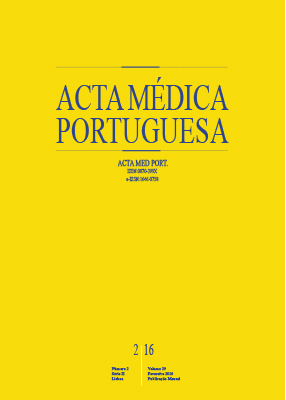Portuguese Consensus on the Diagnosis, Prevention and Treatment of Anaemia in Inflammatory Bowel Disease
DOI:
https://doi.org/10.20344/amp.6058Keywords:
Anemia/diagnosis, Anemia/drug therapy, Anemia/prevention & control, Evidence-Based Practice, Inflammatory Bowel Diseases, Portugal.Abstract
Introduction: Anaemia can be considered the most common extra-intestinal manifestation in inflammatory bowel disease. Nevertheless, anaemia is often under-diagnosed and under-treated both in adults and children with inflammatory bowel disease. Herein, we report the consensus statements on the management of anaemia in inflammatory bowel disease developed by the Portuguese Working Group on Inflammatory Bowel Disease (known as Grupo de Estudo da Doença Inflamatória Intestinal - GEDII) to aid clinicians in daily management of inflammatory bowel disease patients.
Material and Methods: A comprehensive literature review was conducted in order to prepare consensus statements on the following topics: (1) prevalence and diagnosis of anaemia in inflammatory bowel disease, (2) iron supplementation for the prevention of anaemia in inflammatory bowel disease and (3) treatment of anaemia in inflammatory bowel disease. The final statements for each topic were discussed at a consensus meeting and rated according to the Oxford Centre for Evidence-Based Medicine 2011 Levels of Evidence.
Consensus: It was concluded that anaemia has a high incidence and prevalence in inflammatory bowel disease, particularly in those with active disease and hospitalised. Patients with anaemia had decreased quality of life and frequently complained of fatigue. Absolute indications for intravenous therapy should be considered: (1) moderate to severe anaemia (haemoglobin < 10.5 g/dL) or clearly symptomatic anaemia; (2) previous intolerance to oral iron supplements; (3) inappropriate response to oral iron; (4) active severe intestinal disease; (5) need for a quick therapeutic response (e.g. surgery in the short term); (6) concomitant therapy with erythropoiesis-stimulating agent; and (7) patient’s preference.
Downloads
Downloads
Published
How to Cite
Issue
Section
License
All the articles published in the AMP are open access and comply with the requirements of funding agencies or academic institutions. The AMP is governed by the terms of the Creative Commons ‘Attribution – Non-Commercial Use - (CC-BY-NC)’ license, regarding the use by third parties.
It is the author’s responsibility to obtain approval for the reproduction of figures, tables, etc. from other publications.
Upon acceptance of an article for publication, the authors will be asked to complete the ICMJE “Copyright Liability and Copyright Sharing Statement “(http://www.actamedicaportuguesa.com/info/AMP-NormasPublicacao.pdf) and the “Declaration of Potential Conflicts of Interest” (http:// www.icmje.org/conflicts-of-interest). An e-mail will be sent to the corresponding author to acknowledge receipt of the manuscript.
After publication, the authors are authorised to make their articles available in repositories of their institutions of origin, as long as they always mention where they were published and according to the Creative Commons license.









